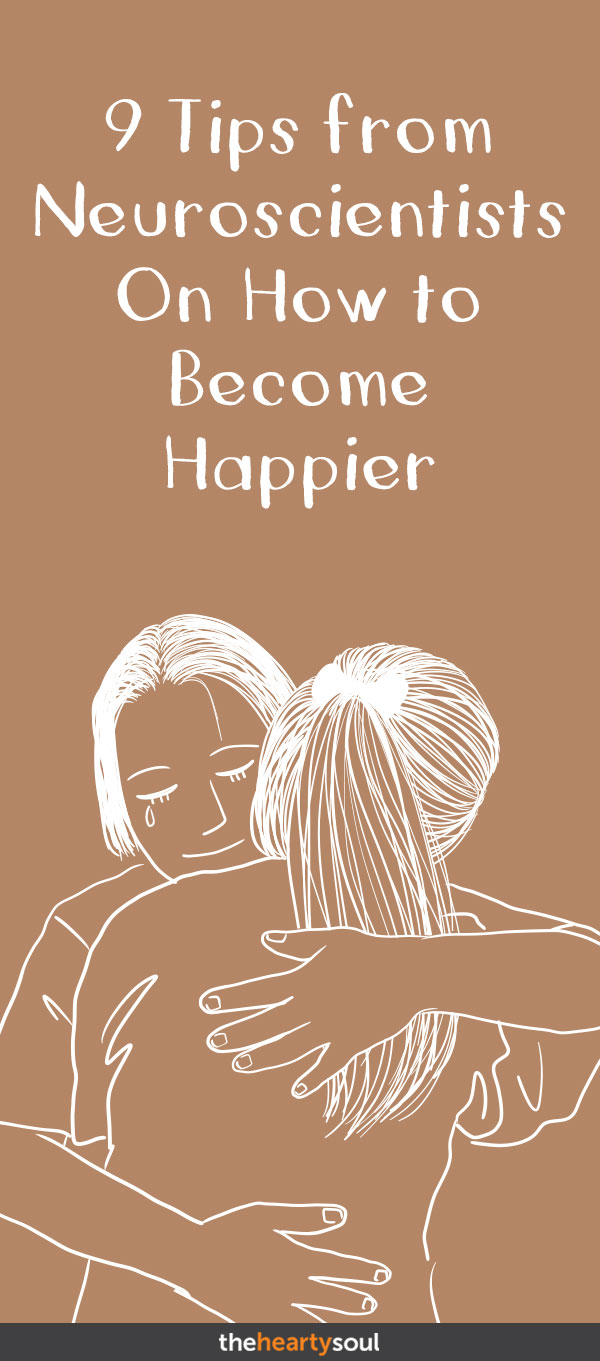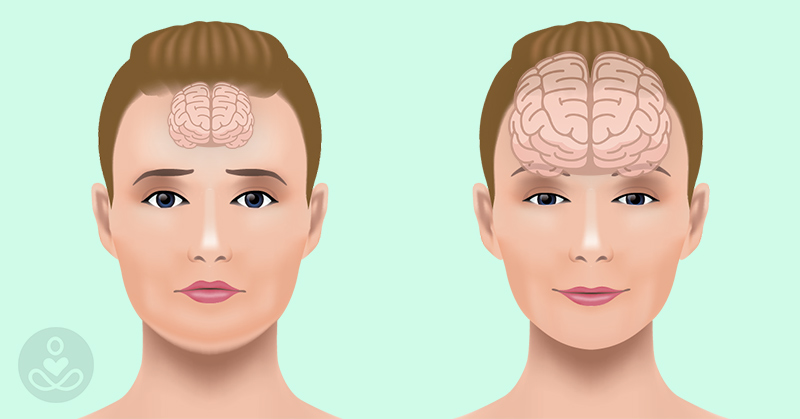When thinking about what you want in life – whether it’s money, fame, love, success, lots of travel – what it all ultimately boils down to is happiness. We all want to be happy; the great job, perfect boyfriend, and dream vacation are just a means to get there. What any major celebrity, wealthy business tycoon, or friend in a seemingly perfect relationship will tell you, is that the “one thing” you thought you needed to make you happy really just brings a momentary high that eventually fades. What does it take to find happiness within ourselves and in our daily lives, even when things aren’t as Instagram-perfect like we like to make people believe. Thankfully, these secrets can be divulged by science.
The Science of Happiness

Neuroscientists spend their entire careers trying to better understand the human brain, the control center of every thought, movement, and feeling. There has been increasing emphasis on studying depression and how to help people be happier. By studying the reward centers of our brains, neuroscientists have found several small, seemingly insignificant behaviors you can do every single day that trigger your brain to be happier.
Read More: Researchers Think They Know Why Cannabis Makes Some People Happy and Some Paranoid
1. Talk about your problems and feelings.

Talking about what is making you sad, worried, stressed, or scared with someone else, be them a friend, family member, or professional, helps us work through our problems and makes them seem a little smaller (like a literal weight off of your chest/shoulders). This simple act releases serotonin in your brain, a neurotransmitter that helps you to feel more positive and constructive. You feel like you have more control over your situation, instead of feeling helpless and in despair, you feel empowered and ready to tackle it head-on. (1, 2, 5, 8)
2. Solve problems one at a time.

This goes along with the first item in this list: Your brain is constantly searching for solutions to every problem and everything that worries you. Anyone who has spent a night lying awake worrying about whether or not they should quit their job, what to get their sister for her birthday, and if they should paint the living room “beachside drive” or charismatic sky” (hint: they’re both blue) can attest to this. This build up of problems makes them seem overwhelming and even the tiniest ones unsolvable. (1)
The solution here (after talking it through with someone) is to tackle each problem one at a time. Each time you make a successful decision, your brain rewards itself with neurotransmitters that calm the limbic system (responsible for higher thought and emotions) and leaves you with a more positive outlook and can-do attitude. Our advice? Start with the small problems (i.e. choosing the paint color) to get the ball rolling and work your way up to the larger issues. (1, 3)
3. Say “thank you” more often.

People who have more gratitude are happier, much to the chagrin of all the pessimists out there. Every time you say thank you, whether it’s to the barista handing you your morning coffee, the coworker who helped you with your computer problem, or that silent word of thanks you send up to the cosmos after a successful sprint for the train, it makes you focus on the positive aspects of your life. These positive, happy memories trigger serotonin production in your brain, which as we know helps to replace anxiety and irritability with joy and optimism. Gratitude and appreciating the small gestures and wins each day help you to develop an overall more positive outlook on your daily life. (1, 2, 4, 5)
4. Learn something new every day.

Each time you learn something new, it changes your brain. Acquiring new knowledge causes a permanent adaptation to a changing environment. As your brain changes and develops, it rewards itself, this time with another chemical dopamine, the happy neurotransmitter. This is the chemical that gets released when your food finally arrives, when you have sex, and even each time you receive a text message. Continuous learning will not only provide you with a greater understanding of the world around you and a new set of skills, it will also make you feel happy and accomplished. (1, 6)
Read More: 22 Things Happy People Do Every Single Day of Their Lives
5. Give lots of hugs.

Humans are a tactile species and physical touch is extremely important to our well being. This can be observed just by watching the progress of babies in the NICU who are given a little extra cuddle time. Touch and embrace are so important that our brains perceive this lack of physical connection the same way it perceives real, physical pain. If you are feeling down, or one of your friends or family members are, go in for that big, warm hug: a silent embrace can often say more than a thousand words ever could. (1, 4, 5, 9)
6. Get some sun.

A little sunshine goes a long way for increasing feelings of happiness, in more ways than one:
Vitamin D: Also known as the sunshine or happy vitamin, vitamin D plays an important role in serotonin production, which as we now know helps you to feel happier. The primary way we get vitamin D is by synthesizing it in our skin from sunlight. (1, 2, 10)
Bright Light in Your Eyes: Bright light through your eyes also increases serotonin activity in your brain. Sunlight is the best way to get this, as despite what you may think, the intensity of the light on a bright sunny day is still about one hundred times higher than the ambient light in your office. (1, 2, 10)
If you’re feeling down, stressed, or anxious, head outdoors for a few minutes and soak up some rays either through your skin or your eyes to feel even just a little more relaxed.
7. Get moving.

Though exercise is good for you for so many different reasons, technically speaking it is still a stressor on your body. When you complete your exercise bout, your brain is hit with endorphins, chemicals that have a similar effect to opiates on your brain. Endorphins have the ability to relieve pain, boost your mood, and just in general feel good. Whether you join a sports team (bonus points for human interaction!) or go for a quick walk on your lunch break, the physical release that comes with exercise can help you feel accomplished, relieve anxiety, and provide you with a happier, more positive attitude.(1, 2, 7)
8. Sleep well.

When you don’t sleep well or enough, you become mentally and physically drained as levels of the stress hormone cortisol get higher and higher. Insomnia and depression go hand-in-hand, often snow balling into one massive problem. You are stressed, so you have trouble sleeping, then you are tired all day, so you have trouble focusing and getting things done, which increases your stress levels, and the cycle continues. Thankfully, there are plenty of things you can do to help you start sleeping better, including yoga, specific herbs and supplements, and many other natural ways to improve sleep patterns. (1, 2, 12)
Read More: 9 Tips on How To Keep A Man Happy and Present
9. Focus on positive memories and upcoming events.

Thinking back to happy memories, for example the fun camping trip you went on last weekend or the nice thing your friend said to you, as well as looking forward to the good things to come, such as your birthday or your decision to order in from your favorite Chinese food place tonight, can increase serotonin and causes a “salivation response”. By both remembering good things that have already happened to you and anticipating the good things to come will help you to feel more positive about your life as a whole. (1, 2, 13, 14)
The Conclusion

We aren’t trying to say that getting promoted, married, or an Olympic gold medal won’t make you happy, because they will! Only that happiness is only temporary. You’ll be happy for one day, but what about the other 364 days of the year? Keep working toward your goals, and while you are on your way to becoming CEO, take the time to go for a walk in the sunshine with a friend and tell them how stressed and worried you are about the future. You’ll enjoy the ride to the top a lot more that way. Everyone deserves to be happy, so help us spread the joy by sharing this article with your friends and family!

Read More: 105-Year-Old Doctor Offers Life Advice on How to Live Longer and Be Happy Every day
Sources
- (2) Korb, A. (2011, November 17). Boosting Your Serotonin Activity. Retrieved August 11, 2017, from https://www.psychologytoday.com/blog/prefrontal-nudity/201111/boosting-your-serotonin-activity
(3) Limbic systems for emotion and for memory, but no single limbic system. (n.d.). Retrieved August 11, 2017, from https://www.sciencedirect.com/science/article/pii/S0010945213003110
(4) Emmons, R. A. (n.d.). The Science of Subjective Well-Being. Retrieved August 11, 2017, from https://books.google.ca/books?hl=en&lr=&id=uoD1Ly9CeRAC&oi=fnd&pg=PA469&dq=gratitude%2Beffect%2Bon%2Bbrain&ots=CN6paKKh1f&sig=rbbp0XxOJjNeKcnLCRMRGg_Q7L0#v=onepage&q=gratitude%20effect%20on%20brain&f=false
(5) The role of serotonin in human mood and social interaction: Insight from altered tryptophan levels. (n.d.). Retrieved August 11, 2017, from https://www.sciencedirect.com/science/article/pii/S0091305701006700
(6) Deans, E. (2011, May 13). Dopamine Primer. Retrieved August 11, 2017, from https://www.psychologytoday.com/blog/evolutionary-psychiatry/201105/dopamine-primer
(7) Exercise and Depression. (n.d.). Retrieved August 11, 2017, from https://www.webmd.com/depression/guide/exercise-depression
(8) Goldsmith, B. (2011, March 03). Talk About Your Problems, Please. Retrieved August 11, 2017, from https://www.psychologytoday.com/blog/emotional-fitness/201103/talk-about-your-problems-please
(9) Touch for socioemotional and physical well-being: A review. (n.d.). Retrieved August 11, 2017, from https://www.sciencedirect.com/science/article/pii/S0273229711000025
(10) Nall, R. (2015, November 09). What Are the Benefits of Sunlight? Retrieved August 11, 2017, from https://www.healthline.com/health/depression/benefits-sunlight#overview1
(12) Taylor, D. J. (2008, April 01). Insomnia and Depression. Retrieved August 11, 2017, from https://www.ncbi.nlm.nih.gov/pmc/articles/PMC2279745/
(13) Foland-Ross, L. C., Cooney, R. E., Joormann, J., Henry, M. L., & Gotlib, I. H. (2014, June). Recalling happy memories in remitted depression: A neuroimaging investigation of the repair of sad mood. Retrieved August 11, 2017, from https://www.ncbi.nlm.nih.gov/pmc/articles/PMC3995858/
(14) Stringaris, A., Vidal-Ribas, P., Artiges, E., Lemaitre, H., Gollier-Briant, F., Wolke, S., . . . IMAGEN, C. O. (2015, December). The Brain’s Response to Reward Anticipation and Depression in Adolescence: Dimensionality, Specificity, and Longitudinal Predictions in a Community-Based Sample. Retrieved August 11, 2017, from https://www.ncbi.nlm.nih.gov/pubmed/26085042

